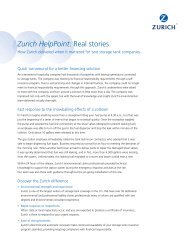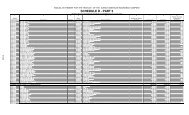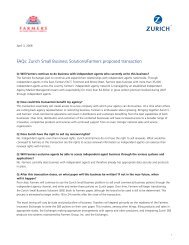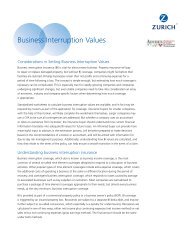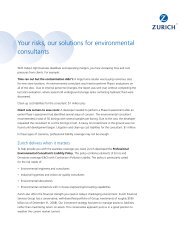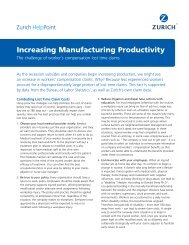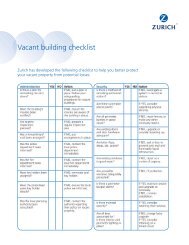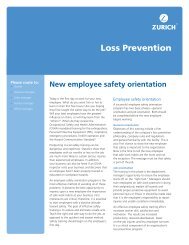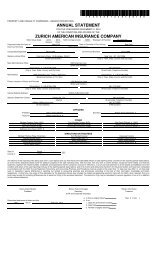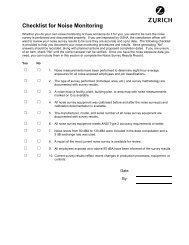Know the risks - Zurich
Know the risks - Zurich
Know the risks - Zurich
You also want an ePaper? Increase the reach of your titles
YUMPU automatically turns print PDFs into web optimized ePapers that Google loves.
Claims by or on behalf of<strong>the</strong> institutionClaims by <strong>the</strong> institutionAn institution may bring a direct action against current or, more often, former directorsand officers for breaching duties to <strong>the</strong> institution or its shareholders. The institution’sboard of directors generally has <strong>the</strong> power to determine whe<strong>the</strong>r or not such a lawsuitshould be filed against <strong>the</strong> institution’s directors and officers and, if it is filed, controlsall strategic decisions regarding <strong>the</strong> litigation. When an institution is insolvent orbankrupt, an entity that “stands in <strong>the</strong> shoes” of <strong>the</strong> institution, like a trustee, receiver,liquidator, or <strong>the</strong> FDIC, may also initiate a claim directly against current or formerdirectors or officers of <strong>the</strong> institution. The plaintiffs in those cases will often allegethat <strong>the</strong> directors and officers fraudulently transferred or misappropriated funds, orengaged in gross mismanagement, causing <strong>the</strong> institution’s insolvency or bankruptcy.Derivative claimsA derivative action may be brought by one or more shareholders on behalf andfor <strong>the</strong> benefit of <strong>the</strong> institution to recover for losses or damages suffered by <strong>the</strong>institution. If a harm or loss is suffered directly by <strong>the</strong> institution, <strong>the</strong>reby reducing<strong>the</strong> value of its assets, shareholders are usually required to bring a derivative lawsuit,ra<strong>the</strong>r than a direct lawsuit.Derivative lawsuits are frequently brought against incumbent directors who, becauseof <strong>the</strong>ir own self-interest, elect not to authorize such an action by <strong>the</strong> institutionagainst <strong>the</strong>mselves or o<strong>the</strong>r directors. Recovery in a derivative lawsuit is paid to <strong>the</strong>institution, not to <strong>the</strong> shareholders who brought <strong>the</strong> action, although <strong>the</strong> fees andexpenses of <strong>the</strong> shareholders’ attorneys are usually paid if a favorable settlement orjudgment is obtained.Because a derivative action is brought on behalf of <strong>the</strong> corporation and becausedirectors are normally entitled to deference in <strong>the</strong>ir corporate decisions (including <strong>the</strong>decision whe<strong>the</strong>r to pursue legal action), a shareholder seeking to bring a derivativeclaim usually must first ei<strong>the</strong>r demand that <strong>the</strong> board authorize <strong>the</strong> company toprosecute <strong>the</strong> claim directly or demonstrate <strong>the</strong> futility of making such a demand. 37In <strong>the</strong> face of a derivative lawsuit, directors will often appoint a special litigationcommittee comprised of disinterested directors to independently evaluate whe<strong>the</strong>rpursuing <strong>the</strong> proposed litigation is in <strong>the</strong> best interests of <strong>the</strong> corporation. Generally,if <strong>the</strong> committee is independent in both its investigation and conclusions, a court willdefer to <strong>the</strong> committee’s decisions whe<strong>the</strong>r continuing or terminating <strong>the</strong> litigation isin <strong>the</strong> best interest of <strong>the</strong> corporation.37 Kamen v. Kemper Fin. Servs., Inc., 500 U.S.90 (1991); Levner v. Saud, 903 F. Supp. 452(S.D.N.Y. 1994), aff’d, 61 F.3d 8 (2d Cir. 1995).When <strong>the</strong> FDIC has taken control of a depository institution, FIRREA vests in <strong>the</strong>FDIC all rights and powers of a shareholder of <strong>the</strong> institution to bring a derivativeaction. Accordingly, in such instances, <strong>the</strong> FDIC has <strong>the</strong> right, power and privilege todemand corporate action or sue directors when action is not o<strong>the</strong>rwise forthcoming.18Financial institutions guide



